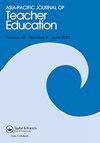伙伴关系还是处方:爱尔兰共和国高等教育学校伙伴关系政策的批判性话语分析
IF 1.6
3区 教育学
Q2 EDUCATION & EDUCATIONAL RESEARCH
引用次数: 2
摘要
摘要爱尔兰共和国的教师教育改革议程具有变革性,这源于内部趋势、对超国家排名指标的日益重视,以及对现有教师教育的国家和国际审查提出的建议。作为这一改革议程的一部分,爱尔兰教学委员会支持高等教育机构(HEI)与学校合作的模式,具体体现在《塞姆:初级教师教育标准》(教学委员会,2020年)和《学校安置指南》(教学委员会,2021年)中。通过批判性话语分析,我们揭示了语言是如何指向政策中的两个关键合作伙伴的,即高等教育机构和学校。调查结果揭示了一系列正在破坏伙伴关系概念的议程,包括语言如何取代关键利益攸关方的角色和责任。最后,考虑到更广泛的政策和政治影响,我们呼吁在教师教育中进行进一步的批判性政策研究。本文提供了一个理论导向的框架,可以支持对此类政策的批判性解读。本文章由计算机程序翻译,如有差异,请以英文原文为准。
Partnership or prescription: a critical discourse analysis of HEI-school partnership policy in the Republic of Ireland
ABSTRACT The Republic of Ireland has witnessed a transformative reform agenda in teacher education, stemming from internal trends, increased emphasis on supranational ranking indicators, and recommendations from national and international reviews of existing teacher education. As part of this reform agenda, the Teaching Council of Ireland has espoused models of higher education institution (HEI)-school partnerships, crystallised in Céim: Standards for Initial Teacher Education (Teaching Council, 2020) and Guidelines on School Placement (Teaching Council, 2021). Using critical discourse analysis, we unpack how language is directed to two key partners within the policies, namely higher education institutions and schools. Findings unpack a range of agendas at play that are undermining the notion of partnership, including how language can displace the roles and responsibilities of key stakeholders. We conclude with a call for further critical policy research in teacher education, given the wider policy and political influences at play. This paper offers a theoretical-oriented framework that can support a critical reading of such policies.
求助全文
通过发布文献求助,成功后即可免费获取论文全文。
去求助
来源期刊

Asia-Pacific Journal of Teacher Education
EDUCATION & EDUCATIONAL RESEARCH-
CiteScore
4.40
自引率
7.70%
发文量
29
期刊介绍:
This journal promotes rigorous research that makes a significant contribution to advancing knowledge in teacher education across early childhood, primary, secondary, vocational education and training, and higher education. The journal editors invite for peer review theoretically informed papers - including, but not limited to, empirically grounded research - which focus on significant issues relevant to an international audience in regards to: Teacher education (including initial teacher education and ongoing professional education) of teachers internationally; The cultural, economic, political, social and/or technological dimensions and contexts of teacher education; Change, stability, reform and resistance in (and relating to) teacher education; Improving the quality and impact of research in teacher education.
 求助内容:
求助内容: 应助结果提醒方式:
应助结果提醒方式:


